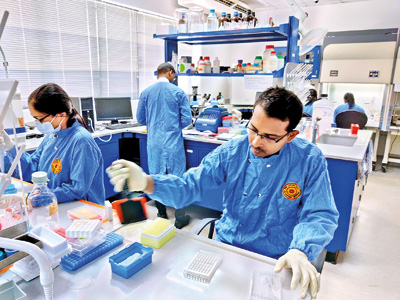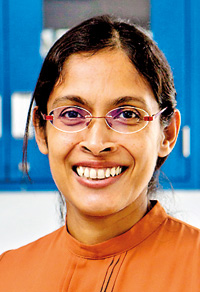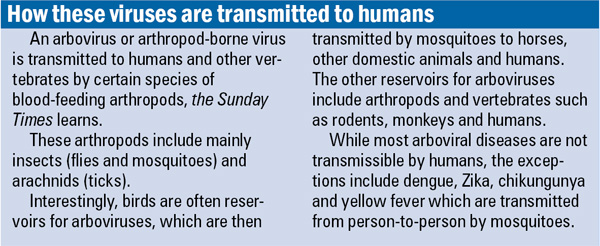News
J’pura’s Dengue Centre secures major grant to study arboviruses
Tiny Sri Lanka has been sky-rocketed to the world stage in the sphere of arboviruses to help combat diseases caused by such viruses.

The state-of-the art Dengue Research Centre laboratory at the Sri Jayewardenepura University
Securing a US$ 1.15 million grant, the University of Sri Jayewardenepura’s Centre for Dengue Research has become a strong part of the global ‘Asian and American Center for Arbovirus Research and Enhanced Surveillance Programme’ (A2CARES).
This major grant to the Centre for Dengue Research headed by Prof. Neelika Malavige and supported by Dr. Chandima Jeewandara, has been awarded by the National Institutes of Health/National Institute of Allergy and Infectious Diseases (NIH/NIAID) of the United States of America (USA), on the basis of the progressive work carried out by the centre.
The collaborative team that Prof. Malavige and Dr. Jeewandara would work with in Sri Lanka includes Dr. Ananda Wijewickrama of the National Institute of Infectious Diseases (NIID), Angoda; Dr. Hasitha Tissera of the Health Ministry’s Epidemiology Unit; and Prof. Thashi Chang of the Department of Clinical Medicine, Faculty of Medicine, University of Colombo.
Explaining what arboviruses are, Prof. Malavige tells the Sunday Times that they are a group of viruses which are transmitted by mosquitoes, ticks or other arthropods.
“Sri Lanka has been battered by mosquito-borne diseases such as dengue, malaria and Japanese encephalitis. We have also reported some cases of the West Nile virus,” she says, going into the nitty-gritty of how A2CARES would operate under the direction of Dr. Eva Harris and Dr. Josefina Coloma both from the University of California, Berkeley, USA.
Working as a consortium, A2CARES would bring under its umbrella world-renowned investigators from the USA, United Kingdom (UK), Nicaragua and Ecuador as well as Sri Lanka, with expertise varying from arbovirology to epidemiology, immunology, viral diagnostics, phylogenetics and clinical research.
Referring to the vicissitudes faced worldwide due to the rampage of the tiny new coronavirus, Prof. Malavige underscores that A2CARES hopes to establish a network of clinical and laboratory sites to be the foundation for research on arboviruses.
The aim is to compare arboviral diseases across the different geographic regions, develop and implement cutting-edge molecular and serological testing methods and respond efficiently and effectively to new disease outbreaks.

Prof. Neelika Malavige. Pix by Sameera Weerasekera
“This is timely. COVID-19 has proven that it is crucial to have a global surveillance system to detect new and emerging infections. When we look at arboviral infections, we don’t have a good idea regarding the burden created by them,” says Prof. Malavige, adding that the research project also aims to identify the viruses responsible for neurological infections and unusual severe febrile infections in Sri Lanka.
Picking up one of her favourite focuses which is dengue, she says that they hope to compare the complications due to dengue and other arboviral infections in Sri Lanka and Latin America, to come up with lasting solutions.
A2CARES will be part of the Centers for Research in Emerging Infectious Disease (CREID), a coordinated network of 10, in regions around the globe where emerging and re-emerging infectious disease outbreaks are likely to occur.
Within this network, multidisciplinary teams will keep a close eye on micro-organisms which cause diseases and their hosts (pathogen/host surveillance); study pathogen transmission, pathogenesis and immunologic responses in the host; and develop reagents and diagnostic assays for improved detection of important emerging pathogens and their vectors.
The CREID Coordination Centre will be the non-profit Research Triangle Institute (RTI) and Duke University. Based in North Carolina, USA, the RTI has regional and project offices in over 75 countries and Duke University is the home of the Duke Human Vaccine Institute.
A media release stated: “The consortium leverages research infrastructure and expertise in long-term cohort and hospital-based studies in the three partner countries in Asia and Central and South America. With three decades of collaborative international research and over 200 joint publications, A2CARES investigators have extensive experience in preparing for and responding to outbreaks working closely with local and international health authorities and NIAID.
“The COVID-19 pandemic has demonstrated the capacity of novel human pathogens to emerge rapidly and cause widespread epidemics with new, and potentially severe, clinical outcomes. The current pandemic emphasizes the urgent need to put in place flexible and coordinated systems that can quickly respond to the emergence of pathogens and provide high-quality clinical data and specimens for multidisciplinary research efforts. A2CARES and CREID will lower the future global risk from new viruses by creating global capacity to respond to these threats.”
The other partner institutions and key collaborators in A2CARES include: in the USA – Aravinda de Silva (University of North Carolina), Aubree Gordon & Joseph Eisenberg (University of Michigan), Leah Katzelnick (National Institutes of Health), Jesse Waggoner (Emory University), Shannon Bennett (California Academy of Sciences) & Ian Lipkin (Columbia University); in Nicaragua – Angel Balmaseda (Sustainable Sciences Institute) & David Parajon (AMOS Health and Hope); in Ecuador – Gabriel Trueba (San Francisco de Quito University) & Varsovia Cevallos (CIREV, National Health Research Institute INSPI); and in the UK – Nuno Faria (Imperial College London, Oxford University).


